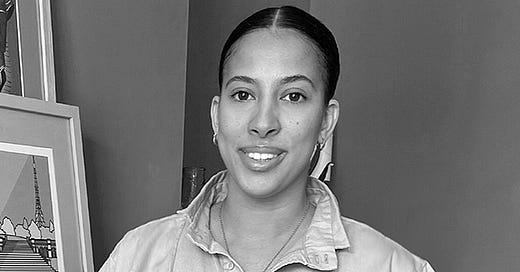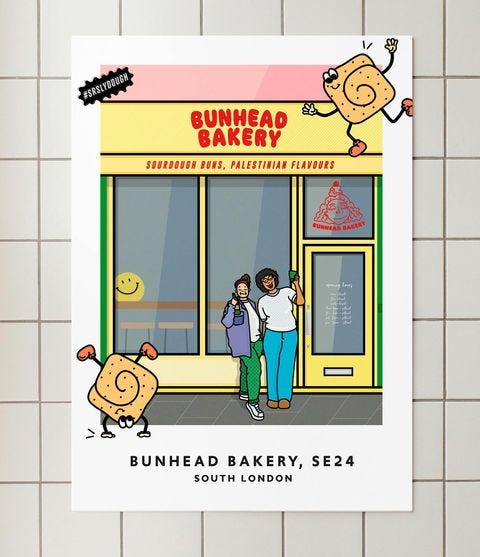Emily Chin-Sillah: “This country is so big on making sure you’re labelling yourself ‘correctly’”
The illustrator on paying homage to her Chinese heritage, identifying with countries over labels and comfort in her upbringing
Hi, welcome back to Mixed Messages! This week, I’m speaking to Emily Chin-Sillah, who is of mixed-Chinese, Jamaican and white British heritage. Emily is the illustrator behind Chin Chin Prints, whose prints pay homage to South London (represent.) Fittingly, I first came across Emily at Salad Days Market, my go-to small business pop-up across South London. Her mix is emblematic of Jamaica’s history of migration and a refreshing reminder of the diversity in the country. Read her story below.
How do you define your identity?
My dad is Chinese-Jamaican, my mum is British English. I’ve grown up identifying as mixed-race, but when people ask me where I’m from, I’ll say I’m chinese-Jamaican-English. My heritage and culture is really important to me, so I identify with my countries rather than the label.
I’ve been in spaces where I get grouped with Black people and I don't feel uncomfortable with that. I understand why people perceive me that way. If someone was to label me as white, I don’t identify with that at all, those aren’t my lived experiences.
There’s a big Chinese diaspora in Jamaica – did that culture come through in your upbringing?
Amongst Jamaican people, my race is very common. It’s only in this country where people are surprised. My dad was born in Jamaica and came here at quite a young age with his parents, both born in Jamaica. My Grandad is fourth-generation Chinese born in Jamaica, so they identify as Jamaican.
My dad’s a Buddhist, so I’ve grown up with a strong connection to my Chinese history and heritage. We celebrate Chinese New Year, jade is a really precious stone, we give red envelopes for birthdays and weddings… We pay homage to our Chinese ancestors through little things, but I think it’s more through my dad’s religion. Nobody speaks Mandarin, everybody speaks patois.
Did you grow up with Jamaican culture in your household?
Only Jamaican culture. Sometimes people are really shocked about that. My mum married my dad quite young and really embraced his culture. We only really ate Caribbean food. That’s why when people identify me as Caribbean, I’m not going to dismiss it. That’s most in sync with my lived experience.
There were also the sounds I grew up with. In Caribbean culture, it’s common to have communal food on a Sunday, like a Sunday dinner. You’d have reggae playing for the whole day with a traditional Caribbean breakfast in the morning. Reggae is the soundtrack to my whole childhood.
I've been going to Notting Hill Carnival since I was in my mum's stomach. There’s cultural things my parents thought were important for us to be involved in from a very young age. I played the steel drum for 13 years until it became ‘not cool’ in my teens. I didn't even see that my parents made a conscious decision to honour my heritage until I realised these little things would only happen in a Caribbean house.
Do you think growing up in South London helped you feel more grounded?
My first lived experience of direct racism was when I worked as a checkout girl in Waitrose on Marylebone High Street. An elderly white customer called me a monkey and told me to go back to where I came from. I was so confused – was she telling me to go back to South London?
We grew up in Deptford, neighbouring Bermondsey, so there were a couple of instances where my mum crossed over into Bermondsey and was warned ‘you shouldn’t be around here, there’s an EDL march soon…’ She's got stories of where people have been racist to me as a child but I hadn’t detected it, my consciousness of being other only happened in my late teens. That's a privilege, and I’m aware of that.
I’m also aware I haven’t had to constantly justify myself, I've never been questioned on my Jamaicanness. In Jamaica, it’s a melting pot of nationalities, it's very common to identify as Jamaican even if you're not Black. Whereas in this country, they’re so big on making sure you’re labelling yourself ‘correctly.’
Have you noticed any stereotypes coming through in conversations around mixedness?
There's always an assumption that if you're mixed-race, it must have been really difficult for you growing up. You must not have a sense of belonging. My experience is not that. I’ve not really had labels put on me other than in secondary school. There was a phase where people thought mixed-race people thought they were too nice or stuck up – I’m actually really introverted.
Did you ever speak to your family about being mixed?
Not specifically. My mum’s amazing, she made sure we grew up very in tune with our identity, celebrating it. She was big on not letting us straighten our hair or do anything that modifies how God intended us.
My mum embraced so much of our Caribbean culture, it was almost like the white side got neglected. She wanted to be a voice for those who didn’t have one. She knows we live in a country that is systemically racist, and the people responsible for the racism look like her. She doesn't wear her whiteness like a badge of honour, she sees it as a duty to be a vigilante.
Do you think your heritage has impacted your work in any way? Being mixed is often something my guests cite made them more creative.
Maybe not consciously, but when I launched Chin Chin Prints during the pandemic, I was a faceless brand for two years. I was very conscious of not showing my face in case it changed people’s shopping habits. It was only during the Black Lives Matter movement where people would start tagging me in posts about shopping Black-owned businesses. I remember the first time I was ever tagged, I felt like, ‘I don’t know if I want people to know this.’ Then I thought, ‘if you hate me, I don’t want your money anyway.’
What’s the best thing about being mixed for you?
Your receptors are way more advanced than the average person. You’re always learning and absorbing information. Everything is welcomed and embraced by default. You find it easier to celebrate what other people would find uncomfortable. I’m not set in my ways, I’m very open to being taught, educated and exposed to new things.
Can you sum up your mixed experience in one word?
Celebrated. I’m so proud of where I’m from. I've had such a privileged upbringing where I haven't once felt imbalanced or shamed or a sense of not belonging. I've been brought up in a really nourishing environment where I've been celebrated and not just by family.
Next week, I’ll be speaking to Bouclème founder Michele Scott-Lynch. Subscribe to get Mixed Messages in your inbox on Monday. Shop Mixed Messages on Etsy now!
Enjoy Mixed Messages? Support me on Ko-Fi! Your donations, which can start from £3, help me pay for the transcription software needed to keep this newsletter weekly, as well as special treats for subscribers. I also earn a small amount of commission (at no extra cost to you) on any purchases made through my Bookshop.org and Amazon affiliate links, where you can shop books, music and more by mixed creators.
Mixed Messages is a weekly exploration of the mixed-race experience, from me, Isabella Silvers. My mom is Punjabi (by way of East Africa) and my dad is white British, but finding my place between these two cultures hasn’t always been easy. That’s why I started Mixed Messages, where each week I’ll speak to a prominent mixed voice to delve into what it really feels like to be mixed.









"What’s the best thing about being mixed for you?
Your receptors are way more advanced than the average person. You’re always learning and absorbing information. Everything is welcomed and embraced by default. You find it easier to celebrate what other people would find uncomfortable. I’m not set in my ways, I’m very open to being taught, educated and exposed to new things."
I love this!